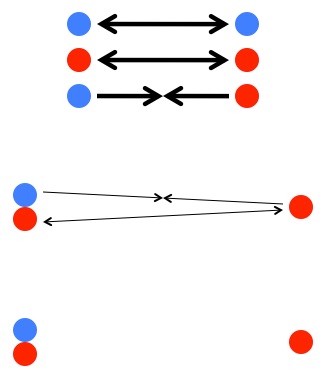Physicist: The problem with magnetism and the electric force is that they tend to cancel themselves out. For example, if you have a positive charge the first thing it does is repel all the other positive charges around it and attract all the negative charges. In short order you end up with a positive and negative charge right next to each other, pulling and pushing on every other charge with the same force (however much the positive charge pulls, the negative charge next to it pushes and vice versa).

(Top) Like charges repel and unlike charges attract. (Middle) A pair of opposite charges will tend to grab onto each other, but this pair pulls as much as it pushes on other nearby charges. (Bottom) The result is that the effect of the charges cancels out and we’re left with “electrically neutral” matter.
Same thing with magnets, if you have two bar magnets floating around, they’ll try to line up with their north side next to the other magnet’s south side.
As a result these “positive/negative” forces tend to balance out really fast. There are “dipole forces” (one charge might be a little closer, so it pulls just a skosh harder), but dipole forces are tiny and decrease much faster with distance (technically, all magnets are dipole). In your body right now you have somewhere in the neighborhood of 1028 or 1029 (between ten and a hundred thousand trillion trillion) charged particles in the form of protons and electrons. The number of extra, unbalanced charges on a good Van de Graff generator that’s dangerous to approach is less than a billionth of a billionth of that.

A slight imbalance of charge. The ratio of positive to negative charges here is on the order of 1 to 1.0000000000000000001.
Point is; with magnets and charges you always have a problem with things canceling themselves out almost perfectly. The strength of the electric force between (for example) two protons is just a hell of a lot stronger than the gravitational force (about 1,000,000,000,000,000,000,000,000,000,000,000,000 times bigger), but you’d never know it since those huge forces are all balanced and cancelled out by all of the negative charges around.
Gravity, on the other hand, has only one kind of “charge”: matter. All matter attracts all matter, so despite being far and away the weakest force, gravity is basically the last man standing on large scales. You might imagine that if gravity acted like magnetism there would be planets and stars pushing and pulling each other every which way, but in all likelihood we just wouldn’t have large structures in the universe like planets in the first place.







Thanks! Great diagram and explanation, and I love the photo of the little girl!
What I have wondered for awhile about gravity is if it might be an equal and opposite reaction to The Big Bang. As the universe is believed to continue to spread outward from an initial explosion, gravity, in a sense, seems to have an opposite effect, simultaneously pulling things together in a way that I think relates a great deal to their mass. Think of recoil in a vacuum.
Technically the equations for electromagnetism and gravity are proportional to one another, however, Gravity is proportionally negative to the equation for electromagnetism, which means that “like” charges of Gravity attract, while like charges of electromagnetism repel. If there were two “charges” of gravity, it would be positive and negative mass. Positive mass attracts to positive mass, negative mass attracts to negative mass, but positive and negative mass repel each other. There could easily be negative mass in the universe, but it would all be congregated really far away from our neck of the universe, so we would never know.
Though even then, you also have to consider that F=ma, and so for negative mass, the acceleration, and ultimately the direction of movement, would be in the reverse direction as the force, which means negative masses would repel each other, and negative masses would be attracted to positive masses, but positive masses would be detracted from negative masses, which would create a dichotomy in which all mass(+/-) accelerates away from negative masses, and all mass(+/-) accelerates toward positive masses. In that case, all positive mass would congregate into a structure like our universe, then assuming the balance of positive and negative mass was equal, Positive mass would congregate while negative mass chases it, but the negative mass would also disperse from its self, which would cause a semi-sphere of negative mass to encompass one side of the positive mass collection, squishing the positive mass into the shape of a rain drop? And the pairs would accelerate away in any particular direction. Though the whole of the universe wouldn’t need to form into a singular structure of this style, it would probably tend to form into very large structures nonetheless. This is assuming that the universe isn’t composed of infinite material. In that case… I have no idea.
Welcome back. With the last post on 7/23, I had concerns about your whereabouts. No need to reply, just glad to see your 10/27 post.
My problem in this discussion is vexing: anyone can help me here? Could a reasonable argument be that the so-called Big Bang has emerged from one of a series of Big Bangs that have been going on without any change, for ever. Our “big bang” of current interest in our present firmament owes its origins to raw material fashioned from previous big bangs going off all around the neighborhood – so to speak. If, as one argument suggests, the creation as we know it is indeed without edge or ending, then how else could there become constant re-formation of new, decaying, birthing, and aging entities?
In the long history of the world, no one has discovered the mechanism of how two objects, planets or proton/electron, attract each other. We can call something a field, or invent a curved structure existing in empty space, but the follow-on question of mechanism remains unanswered. Would it not be prudent to reconsider this idea of attraction? Is it not possible that apparent attraction could be differentials between repelling, or bombarding, forces? At least we can understand such a mechanism.
Yay! Your back!
Hope your research and such is going well!
Back in action! Looks like I wasn’t the only one worried!
In a way it is perhaps an oversight to say that gravity is a weak force as opposed to electrodynamic forces. It is a matter of context.
The reasoning is that, if one takes the universe as a whole, the amount of total electromagnetic force expended at rest logically seems exactly equal to total gravity expended, since gravity was once thought to be at least trying to quazi-collapse matter to a singularity and electrodynamic forces continuously contrive to keep it from doing so. In other words, just a little more gravity and heavenly bodies would logically be squashed just a bit smaller in diameter… or inversely, given a little less gravity, bodies would swell just a bit. Most importantly, in all cases, the expenditure of electrodynamic forces would re-adjust to remain absolutely equal to any sane value of gravity. All bets may be off when gravity wins and reaches the strength of a black hole.
So what does this mean, if anything? It means that in a global context, three values in our universe are overall, equal. 1)Gravity, 2)opposing electrodynamic force and 3)Einstein’s (opposing) cosmological constant. Offhand, this is a key principle in a more elaborate idea I once had to improve our human understanding of his relativities and cosmology.
The exact meaning of gravity is the force which help us balance or hold us back from floating. If gravity changed into magnetism then we would be attracting to every places and there wont be any forces to repel us.
Julis said: [i]”The exact meaning of gravity is the force which help us balance or hold us back from floating. If gravity changed into magnetism then we would be attracting to every places and there wont be any forces to repel us.”[/i]
On the contrary, magnetism also repels (like charges or poles do). Because the force of gravity is really a repulsion as per Einstein (GR, the elevator floor pushes up, accelerating the occupants in Equivalence), it is possible by logical deduction, during a series of thought experiments, to heuristically show that gravity (acceleration) can most likely be produced by present electrodynamic atomic forces, eliminating gravity as a necessary separate primary force. I don’t think Einstein ever fully realised this, but granted, except for Hubble, there was far less evidence in his day.
Wait doesn’t gravity work to repel mass at large scales?
QUOTE:
Sam says:
May 17, 2016 at 4:46 pm
“Wait doesn’t gravity work to repel mass at large scales?”
Sam,
Unless someone has recently logically postulated (could be) that the conventional “attractive” force of gravity acts differently and becomes repulsive only in some other part of our universe… no.
For one thing this would seemingly interfere with Special Relativity whereas one of Einstein’s two postulates was, “The laws of physics are the same in all inertial frames of reference”, meaning the laws of physics are the same everywhere. (https://en.wikipedia.org/wiki/Postulates_of_special_relativity).
But there is a catch. In order for Einstein to discuss gravity, he had to explain an old conundrum. If every heavenly body is attracted to the other, why don’t the apparent “static” parts of the universe immediately began to collapse upon themselves? In other words, if gravity reaches everywhere, how could distant bodies NOT slowly began to move towards one another. Observation seemed to imply that was not happening, since a lot of freaky undesirable mass would already be headed our way… about as welcome as a run-a-way train.
While he was improving gravity, Einstein therefore did something a little hokey. He reached in his… umm… back pocket… and pulled out a brand new mystery force that he called the Cosmological Constant (https://en.wikipedia.org/wiki/Cosmological_constant). He explicitly designed (asserted) the repulsion of the Cosmological Constant to be exactly the same intensity as gravity and therefore allow the universe to rest in quiet equilibrium. Only the gods know why it didn’t seem to immediately ruin gravity on Earth which still apparently remains a mystery to mere humans.
When Hubble inconveniently discovered that a lot of mass was headed the other way, away from us, Einstein ‘fessed up, abandoned his “static” universe, and proclaimed the hokey Cosmological Constant to be his worst error. It was no longer needed; stuff was flying away from stuff in some sort of Big Bang and the universe was not static like Einstein thought. Now there was no immediate problem, no need for a repulsive force… at least until far reaching gravity maybe slowed things down and the whole process began to reverse itself with scads of undesirable stuff headed our way again.
So the Cosmological Constant fell into the Recycle Bin of science. Only to be revived again in 1998 when a couple of shrewd astronomy teams discovered that the Bang is not slowing down, but rather appears to be speeding up. Out of the Recycle Bin came the Cosmological Constant repulsion to be perhaps re-introduced as Dark Energy. Sure, it’s a little hokey, and dark, but it’s all we’ve got. Or so it seems.
Wes
I think it somewhat frivolous to attempt an explanation of gravity without understanding additional dimensions. The effects of gravity lies outside of explanation using 3 spatial and 1 time.